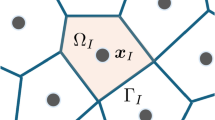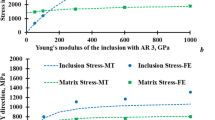Abstract
In this paper, we present a goal-oriented a posteriori error estimation technique for the pointwise error of finite element approximations using fundamental solutions. The approach is based on an integral representation of the pointwise quantity of interest using the corresponding Green's function, which is decomposed into an unknown regular part and a fundamental solution. Since only the regular part must be approximated with finite elements, very accurate results are obtained. The approach also allows the derivation of error bounds for the pointwise quantity, which are expressed in terms of the primal problem and the regular part problem. The presented technique is applied to linear elastic test problems in two-dimensions, but it can be applied to any linear problem for which fundamental solutions exist.
Similar content being viewed by others
References
Babuška I, Miller AD (1984) The post-processing approach in the finite element method, I: calculations of displacements, stresses and other higher derivatives of the displacement. Int J Num Meth Eng 20:1085–1109
Eriksson K, Johnson C (1991) Adaptive finite element methods for parabolic problems I: A linear model problem. SIAM J Numer Anal 28:4377
Estep D (1995) A posteriori error bounds and global error control for approximations of ordinary differential equations. SIAM J Numer Anal 32:148
Eriksson K, Estep D, Hansbo P, Johnson C (1995) Introduction to adaptive methods for differential equations. Acta Numerica 105–158
Becker R, Rannacher R (1996) A feed-back approach to error control in finite element methods: Basic analysis and examples. East-West J Numer Math 4:237–264
Rannacher R, Suttmeier FT (1997) A feed-back approach to error control in finite element methods: application to linear elasticity. Comp Mech 19:434–446
Paraschivoiu M, Peraire J, Patera A (1997) A posteriori finite element bounds for linear-functional outputs of elliptic partial differential equations. Comp Meth Appl Mech Eng 150:289–312
Paraschivoiu M, Patera A (1998) A hierarchical duality approach to bounds for the outputs of partial differential equations. Comp Meth Appl Mech Eng 158:389–407
Çirak F, Ramm E (1998) A posteriori error estimation and adaptivity for linear elasticity using the reciprocal theorem. Comp Meth Appl Mech Eng 156:351–362
Prudhomme S, Oden JT (1999) On goal-oriented error estimation for elliptic problems: application to the control of pointwise errors. Comp Meth Appl Mech Eng 176:313–331
Çirak F, Ramm E (2000) A posteriori error estimation and adaptivity for elastoplasticity using the reciprocal theorem. Int J Num Meth Eng 47:379–393
Oden JT, Prudhomme S (2001) Goal-oriented error estimation and adaptivity for the finite element method. Comp Math Appl 41:735–756
Bangerth W, Rannacher R (2003) Adaptive finite element Methods for Differential Equations. Birkhäuser, Basel
Ainsworth M, Oden JT (2000) A posteriori error estimation in finite elemente analysis. wiley, New York
Babuška I, Strouboulis T (2001) The finite element method and its reliability. Oxford science publications, Oxford
Hartmann F (1985) The mathematical foundation of structural mechanics. Springer, Berlin
Grätsch T, Hartmann F (2004) Duality and finite elements. Finite Elem Anal Des 40:1005–1020
Grätsch T, Hartmann, F (2003) Finite element recovery techniques for local quantities of linear problems using fundamental solutions. Comp Mech 33:15–21
Wang S, Sloan IH, Kelly DW (1998) Computable error bounds for pointwise derivatives of a Neumann problem. IMA J Numer Anal 18:251–271
Grätsch T, Bathe KJ (2005) A posteriori error estimation techniques in practical finite element analysis. Comp Struct 83:235–265
Hartmann F (1989) Introduction to boundary elements. Springer, Berlin
Johnson C, Hansbo P (1992) Adaptive finite element methods in Comp Mech. Comp Meth Appl Mech Eng 101:143–181
Author information
Authors and Affiliations
Corresponding author
Rights and permissions
About this article
Cite this article
Grätsch, T., Hartmann, F. Pointwise error estimation and adaptivity for the finite element method using fundamental solutions. Comput Mech 37, 394–407 (2006). https://doi.org/10.1007/s00466-005-0711-4
Received:
Accepted:
Published:
Issue Date:
DOI: https://doi.org/10.1007/s00466-005-0711-4




